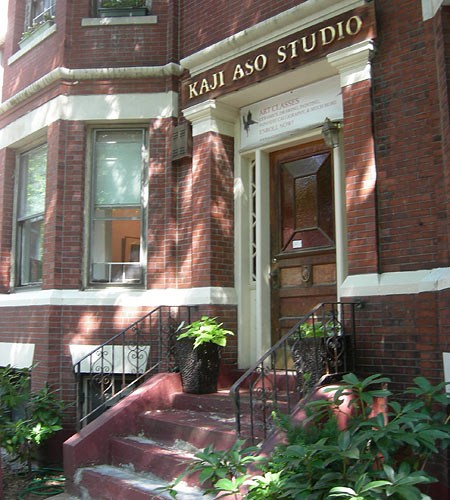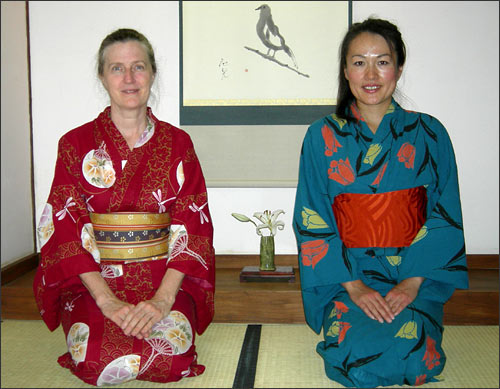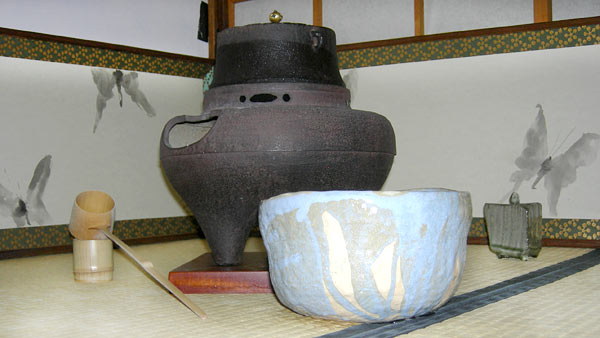
All photos: Alexandra Dimodica
The holidays are upon us, with all related festivities, concerts and shopping in full swing. For some of us, tensions run high. It could be the perfect time, then, to carve out a few hours and…just…relax.
If you live in the area, much-needed relaxation and perspective isn’t hard to find. A traditional Japanese cultural and culinary experience awaits at the Kaji Aso Studio, which I visited a few months ago. Around the corner from Boston’s Symphony Hall, the studio provides patrons with perhaps the best holiday gift of all– a dose of Zen.
Each Sunday afternoon, the studio hosts a traditional Japanese tea ceremony where dedicated tea masters, community members of Kaji Aso Studio and tea ceremony virgins enjoy matcha tea, sweet treats and (that priceless commodity) time with one another.
For twenty-five years, the studio has offered locals and visitors with the opportunity to partake in many Japanese artistic and cultural events, classes and experiences. The studio’s founder, Kaji Aso, was a Japanese artist and cultural connoisseur. Although he passed away, his presence and positive influence is still felt throughout the studio. As the studio’s current tea master and administrator, successor Kate Finnegan is a warm and inviting host. Her love for Japanese culture and traditions is easily translated to each guest during a visit.

Kate Finnegan and Michiko Imai of Kaji Aso Studio
The Japanese tea ceremony is not your average afternoon teatime, of course. It incorporates the particular culture and tea ceremony traditions of Japan, plus Zen teachings. Kate explains that the experience has three important components: “enjoyment of tea, appreciation of the season and enjoyment of friendship.”
Alongside one of the studio’s calligraphy teachers, Michiko Imai, plus a ceramics instructor and a ceramics student, I navigated my way through the new tastes, smells and sights. I tasted a lighter and stronger matcha (a green tea powder traditionally used in tea ceremonies), indulged myself with two sweet treats and spent time in reflection and conversation at the studio’s peaceful teahouse, House of Flower Wind.
The studio’s tea procurement is farm to table through and through. The tea is harvested in select farms outside of Kyoto, and the studio buys the matcha directly from these farms. The tea harvesting process is not to be taken lightly – matcha is made from the first hand picked Spring leaves and a broken leaf cannot be used.
The first sweets we ate were higashi (he-ga-she), a sugar mixed with wisteria starch flour and an additional flavor, such as cherry. The second sweets, which accompanied the more potent matcha, were daifuku (da-ee-foo-koo) and were made of azuki (red bean and sugar) paste and mochi (Japanese rice cake). They were a perfect complement to the high-quality tea.
If the meditative time and fresh tea don’t force you to transcend your holiday woes, the tearoom’s aesthetics certainly will. I drank out of two 1200-year-old chawas (tea bowls), gazed at beautiful Japanese calligraphy and paintings and observed the precise, mezmerizing rituals of tea preparation.

Once you’ve experienced a traditional Japanese tea ceremony, you can incorporate this calm, reflective time into your every day by becoming a “tea friend” at the studio and purchasing matcha tea and preparation materials for use at home. Even in the midst of holiday madness, there IS sanity to be found. Here it’s called a dose of Zen.

I have attended many functions at the Kaji Aso Studio, though not the tea ceremony – not yet. The Kaji Aso Studio is a wondeful and unique place which sponsors lovely concerts and other art-related activities.
Kaji Aso Studio is my springboard into the dear world of the serious and humorous haiku poetry.
I just sent to the haikuists in Belgium my holiday haiku
canals, filled with nights…
the whispery moon crescent
boating in the sky